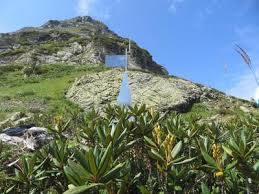The employees of Kubanenergo have erected an obelisk to the heroes of the Battle of the Caucasus in the mountains of Krasnaya Polyana at a height of more than 2000 meters, where the most important battles for Caucasus of the Great Patriotic War took place. For example, when nine Soviet soldiers stopped an attack of mountain rangers of the German army, killing more than 800 soldiers and officers of the Wehrmacht, the press service of Kubanenergo said.
The obelisk is made of stainless steel in the form of a three-sided pyramid based on the design of one of the employees of the Sochi branch of Kubanenergo. There is a metal box at the foot of the rock where the Book of Memory lies. Its sheets with lacquered pieces of paper, on which the stories of the heroism and the names of the soldiers are written, are made of plate.
The obelisk, which weighs about 25 kg, was delivered to the installation site by a tour group, Kuban 24 reports.

The political scientist Alan Kasaev told Vestnik Kavkaza that Baku was producing approximately 70% of all the oil of the Soviet Union during the Great Patriotic War. "Accordingly, most of the oil and gasoline products were made on the territory of Soviet Azerbaijan. Another 10% of the oil was extracted in the district of Malgobek-Grozny. The shortest route from Central Russia to these oil-bearing regions lay, of course, through the territory of the North Caucasus. That was one of the main goals for Hitler. The second important goal was direct access to the Middle East and Asia, the same thing was through the territory of the North Caucasus," the expert explained.
"A big group was created by fascists to capture the North Caucasus. They have made some progress, but were stopped at the turn of Malgobek-Vladikavkaz and further in the west in the Elbrus region. So the Germans did not reach Sochi, but there were some small local clashes. This doesn't diminish the strategic importance of the North Caucasian military operations, and of course, the people who live there have preserved the memory of this for more than 70 years," Alan Kasaev said.
The Deputy Scientific Director of the Russian Military-Historical Society, Mikhail Myagkov, told Vestnik Kavkaza that the Battle of the Caucasus was crucially important for the Victory. "The great Battle of the Caucasus was of great importance for the victory in the Great Patriotic War. If the Soviet Union could not keep Grozny or Baku, the situation on the Soviet-German front would have been very tragic, because the blood of war is the actions of the army. Therefore, in 1942, despite the fact that the central direction was a priority for the Germans, they threw all their efforts to the south to seize Stavropol's bread and, of course, the Caucasus's oil," he said.
"If the Germans had managed to break through to the Caucasus, they not only would have deprived the Red Army of fuel, which is the blood of war, but also greatly enriched their own arsenal, and could possibly have reached the Middle East and India to connect with the Japanese troops. Then the Second World War would have had a completely different scenario," Mikhail Myagkov said.
According to the historian, the positions of the Soviet Army in the Caucasus were not strong at the beginning. "When the Germans started their attacks, the position of the Soviet army in this area was very difficult, the number of troops was inadequate and the situation was quite tragic," he stressed.
The expert noted that, during the Battle of the Caucasus, Soviet soldiers repeatedly demonstrated heroism and added many glorious pages to the history of the Great Patriotic War. "The Battle of the Caucasus is known by many heroic episodes: the Battle for Malgobek, the Battle for Grozny. The closest associates of Stalin actively participated in the defense of Grozny – for example, Beria, who was specially sent to defend the Caucasus direction, who did quite a lot to hold the troops in the Caucasus Mountains. Other warlords such as Budyonny didn't show themselves adequately and eventually were sent to a secondary role," he concluded.






